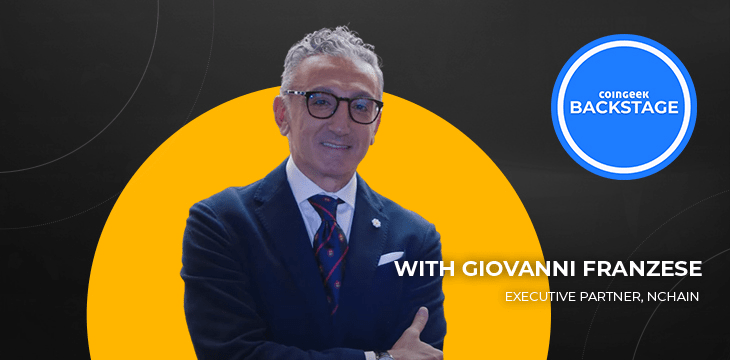|
Getting your Trinity Audio player ready...
|
While the emerging technologies of artificial intelligence (AI) and blockchain have evolved independently, experts are predicting a symbiotic relationship shortly.
In an interview with CoinGeek Backstage at the IEEE COINS Conference 2023, nChain Executive Partner Giovanni Franzese noted that AI needs blockchain to thrive in the face of growing challenges within the ecosystem. The former head of blockchain at Ericson reeled out several use cases for blockchain in AI, pointing to data handling as a critical utility.
“AI needs a blockchain in order to keep the data safe, ensuring the possibility and immutability of data, which only blockchain can provide,” said Franzese.
For Franzese, blockchain may be used to secure the data used in training AI models to ensure immutability and transparency. Apart from protecting training data, Franzese added that blockchain can be leaned on for privacy while providing information on data provenance from collection, storage, and training.
“Privacy and transparency, they are sides of the same coin…and with, for instance, a platform like BSV, you have the possibility to configure the platform to provide transparency—tuning the level of transparency that you basically want,” he said.
Franzese noted that AI developers are yet to pivot to blockchain for their data handling needs, opting to use traditional storage systems. A downside stemming from legacy systems is the risk of a security breach that could lead to private data falling into the wrong hands.
“AI will be another key technology to combine with blockchain, and we will see the wonderful things that the technologies will manage to achieve,” Franzese said. “AI needs to achieve the traceability and immutability of data, which only blockchain will achieve.”
In May, Samsung (NASDAQ: SSNLF) suffered a data leak after an employee inserted a source code into the generative AI platform ChatGPT, forcing the company to implement a blanket ban on AI tools. In the following months, several financial and technology companies like Goldman Sachs (NASDAQ: GS), JP Morgan (NASDAQ: JPM), and Apple (NASDAQ: AAPL) banned using generative AI to prevent a similar data leak.
The fallout of the bans is the increasing trend of large companies building their own proprietary AI systems from scratch for a semblance of privacy. Apple has reportedly splurged millions of dollars on an internal AI chatbot for employee use without any plans for a commercial rollout.
On the flip side, analysts have pointed out that AI can reap some benefits from the functionalities of generative AI. OpenAI’s ChatGPT and Google’s (NASDAQ: GOOGL) Bard have already earned praises for their ability to spot vulnerabilities in intelligent contracts at par with human auditors.
While there are fears of AI replacing auditors, critics have spotted several flaws in using AI in smart contract auditing, including hallucinations and difficulty keeping pace with the evolving tactics of bad actors.
AI developers have come under fire over the internal systems for data collection and handling of sensitive information. OpenAI is currently the subject of investigation by Poland’s Personal Data Protection Office (UODO) for processing data in “an unlawful and unreliable manner” in breach of extant rules.
In order for artificial intelligence (AI) to work right within the law and thrive in the face of growing challenges, it needs to integrate an enterprise blockchain system that ensures data input quality and ownership—allowing it to keep data safe while also guaranteeing the immutability of data. Check out CoinGeek’s coverage on this emerging tech to learn more why Enterprise blockchain will be the backbone of AI.
Watch: AI is for ‘augmenting’ not replacing the workforce

 02-18-2026
02-18-2026 




